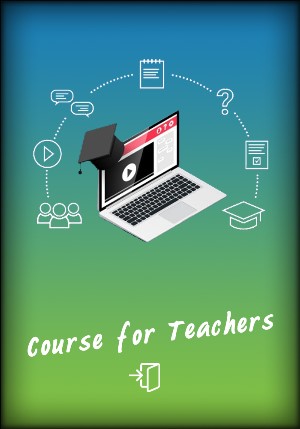Course for Teachers (Course-EN)
The aim of the guide is not only to provide background information and facilitate the use of the materials in the classroom, but also to show ways teachers can personally benefit and also improve school culture.
The Guide for Teachers consists of 5 Modules/Units:
- Module 1: Basic information about the fundamental Concepts - 5 Basic Needs and Strategies to fulfil them
- Module 2: As my own personal needs are concerned ... - A Self-reflection for Teachers
- Module 3: Application of the European Heart Materials in school
- Module 4: Democratic values in school Culture
- Module 5: Practical Examples - using the European Heart Materials in schools
The aim of the guide is not only to provide background information and facilitate the use of the materials in the classroom, but also to show ways teachers can personally benefit and also improve school culture.
The Guide for Teachers consists of 5 Modules/Units:
- Module 1: Basic information about the fundamental Concepts - 5 Basic Needs and Strategies to fulfil them
- Module 2: As my own personal needs are concerned ... - A Self-reflection for Teachers
- Module 3: Application of the European Heart Materials in school
- Module 4: Democratic values in school Culture
- Module 5: Practical Examples - using the European Heart Materials in schools
The aim of the guide is not only to provide background information and facilitate the use of the materials in the classroom, but also to show ways teachers can personally benefit and also improve school culture.
The Guide for Teachers consists of 5 Modules/Units:
- Module 1: Basic information about the fundamental Concepts - 5 Basic Needs and Strategies to fulfil them
- Module 2: As my own personal needs are concerned ... - A Self-reflection for Teachers
- Module 3: Application of the European Heart Materials in school
- Module 4: Democratic values in school Culture
- Module 5: Practical Examples - using the European Heart Materials in schools
Course Description

Aim
The aim of the guide is not only to provide background information and facilitate the use of the materials in the classroom, but also to show ways teachers can personally benefit and also improve school culture.
About the European Heart Project and the Material
About the project
The European Heart project is about democracy in action. If we as a community assume that all people have the same basic needs, we have a solid foundation built on empathy and understanding. Based on this approach, teaching materials have been developed to provide skills and tools to encourage and support young people to participate as responsible European citizens.
The theoretical concepts are taken from William Glasser's Choice Theory and Marshall Rosenberg's Nonviolent Communication.
About the Materials
The European Heart materials are designed for use in the classroom for 13 - 16-year-olds and can be used in mother tongue classes as well as in the subjects of history, political education, language (EN, DE, FR, GR), ethics, philosophy, social studies, arts, and similar.
They fit topics such as: Democracy, inclusion, diversity, cooperation, social skills training, communication, human rights, European values, media literacy and the like.
Materials for Pupils
Toolkit for Pupils
- Booklet 1: Workbook about Basic Human Needs
- Booklet 2: Workbook about Strategies to fulfil one´s Needs
- 5 Booklets 'Learning from History'
Short Movies – Milestones on the way to democracy
- Accompanying videos to the Booklets 'Learning from History' that can support a discourse on basic human needs, developed by pupils.
ACT – Active Citizen Team-Game
- In a playful way, pupils deal with burning socio-political issues and train skills that they need to ACT as responsible citizens.
Products for Teachers
Module Guide for the implementation of the materials in school
- E-Learning Platform containing 4 Modules for teachers to work with the materials across subjects in the classroom.
How to use this Guide
Even though each module represents a unit on a defined topic, we recommend that you consider the individual modules as building on each other.
Start with Module 1 and familiarise yourself with the basic concept.
In Module 2, reflect on your own basic needs and motivations as a teacher, colleague and person. Since teaching the concepts is not only a matter of knowledge but also of attitude, you should also be well prepared on this level when working with the pupils.
Module 3 is fully dedicated to practical implementation in the classrooms. Here you will find clear instructions, tips, information on possible challenges, as well as further advice.
Module 4 is dedicated to the impact of the use of the materials on the school culture: How can the materials be used to make a positive contribution to strengthening democratic values, respectful interaction and participation?
How have other teachers used our materials? Get ideas for your own lessons in Module 5.
The aim of the guide is not only to provide background information and facilitate the use of the materials in the classroom, but also to show ways teachers can personally benefit and also improve school culture.
About the project
The European Heart project is about democracy in action. If we as a community assume that all people have the same basic needs, we have a solid foundation built on empathy and understanding. Based on this approach, teaching materials have been developed to provide skills and tools to encourage and support young people to participate as responsible European citizens.
The theoretical concepts are taken from William Glasser's Choice Theory and Marshall Rosenberg's Nonviolent Communication.
About the Materials
The European Heart materials are designed for use in the classroom for 13 - 16-year-olds and can be used in mother tongue classes as well as in the subjects of history, political education, language (EN, DE, FR, GR), ethics, philosophy, social studies, arts, and similar.
They fit topics such as: Democracy, inclusion, diversity, cooperation, social skills training, communication, human rights, European values, media literacy and the like.
Materials for Pupils
Toolkit for Pupils
- Booklet 1: Workbook about Basic Human Needs
- Booklet 2: Workbook about Strategies to fulfil one´s Needs
- 5 Booklets 'Learning from History'
Short Movies – Milestones on the way to democracy
- Accompanying videos to the Booklets 'Learning from History' that can support a discourse on basic human needs, developed by pupils.
ACT – Active Citizen Team-Game
- In a playful way, pupils deal with burning socio-political issues and train skills that they need to ACT as responsible citizens.
Products for Teachers
Module Guide for the implementation of the materials in school
- E-Learning Platform containing 4 Modules for teachers to work with the materials across subjects in the classroom.
Even though each module represents a unit on a defined topic, we recommend that you consider the individual modules as building on each other.
Start with Module 1 and familiarise yourself with the basic concept.
In Module 2, reflect on your own basic needs and motivations as a teacher, colleague and person. Since teaching the concepts is not only a matter of knowledge but also of attitude, you should also be well prepared on this level when working with the pupils.
Module 3 is fully dedicated to practical implementation in the classrooms. Here you will find clear instructions, tips, information on possible challenges, as well as further advice.
Module 4 is dedicated to the impact of the use of the materials on the school culture: How can the materials be used to make a positive contribution to strengthening democratic values, respectful interaction and participation?
How have other teachers used our materials? Get ideas for your own lessons in Module 5.
Start with Module 1 and familiarise yourself with the basic concept.
In Module 2, reflect on your own basic needs and motivations as a teacher, colleague and person. Since teaching the concepts is not only a matter of knowledge but also of attitude, you should also be well prepared on this level when working with the pupils.
Module 3 is fully dedicated to practical implementation in the classrooms. Here you will find clear instructions, tips, information on possible challenges, as well as further advice.
Module 4 is dedicated to the impact of the use of the materials on the school culture: How can the materials be used to make a positive contribution to strengthening democratic values, respectful interaction and participation?
How have other teachers used our materials? Get ideas for your own lessons in Module 5.

